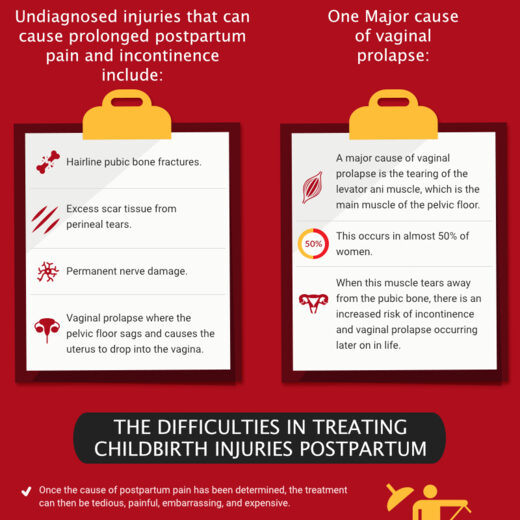Failure by doctors to promptly diagnose postpartum pain from hidden injuries can lead to chronic pain and side-effects, including incontinence in women. Identifying minor injuries soon after giving birth helps prevent major complications from developing that could require high-risk surgery or long-term specialized treatment.
(Article continues below infographic)
Postpartum Pain Often Overlooked
It is common for an ob-gyn to dismiss chronic pelvic pain when everything appears normal during the patient’s exam. Women are often hesitant to discuss the problems they experience because of their childbirth injuries because they relate to uncomfortable topics like sex and incontinence. It is estimated that 24 percent of women experience painful sex 18 months after giving birth and 49 percent continue to experience incontinence 12 months after childbirth.
Undiagnosed injuries that can cause prolonged postpartum pain and incontinence issues include:
- Hairline pubic bone fractures
- Vaginal prolapse where the pelvic floor sags and causes the uterus to drop into the vagina
- Excess scar tissue from perineal tears
- Permanent nerve damage
A major cause of vaginal prolapse is the tearing of the levator ani muscle, which is the main muscle of the pelvic floor. This occurs in almost 50 percent of women. When this muscle tears away from the pubic bone, there is an increased risk of incontinence and vaginal prolapse occurring later on in life.
Treating Childbirth Injuries Postpartum
Once the cause of postpartum pain has been determined, the treatment can then be tedious, painful, embarrassing, and expensive. Women with scar tissue may need to undergo surgery to remove it only to have new scar tissue form or serious infections that could worsen their pain
In some instances, a surgical cure could result in further medical complications. The FDA has rated surgeries to implant transvaginal mesh to fix vaginal prolapse or other injuries to the pelvic floor muscles as high-risk. The mesh implant is supposed to support the bladder and vaginal walls. However, the surgery can cause serious complications like pain during sex, urinary problems, bleeding, and pain during sex.
An option that some women choose instead of surgery is physical therapy. The problem with this is that most insurance companies only cover a limited number of therapy sessions. Therefore, the patient may wind up paying expensive out-of-pocket fees to receive the treatments they need. Exercises that are learned in physical therapy can help loosen scar tissue and strengthen pelvic muscles to support the bladder and uterus and prevent prolapse.

